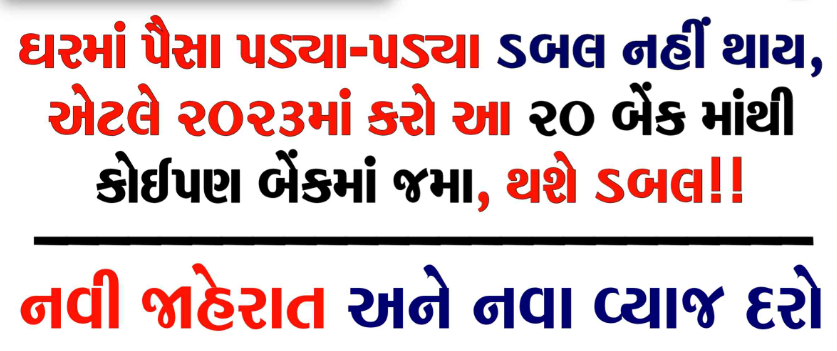Top Highest Fixed deposit rates: Find out the latest highest FD rates for investing in fixed deposits in India for investment tenures ranging from 7 days to 10 years.
Top Highest Fixed deposit rates
1) DCB Bank FD normal interest rate 8% and senior citizens interest 8.5%
2) Union Bank of India FD normal interest 7.3% and senior citizens interest 7.8%
3) Indian Overseas Bank FD normal interest 7.25% 7.75% interest for senior citizens
4) General interest in Federal Bank FD 7.25% and interest for senior citizens 7.75%
5) Dhanlaxmi Bank FD Ordinary Interest 7.25% & Senior Citizen 7.75%
6) Indian Bank FD Ordinary Interest 7.25% & Senior Citizen 7.75%
7) Canara Bank FD Ordinary Interest 7.25% & Senior Citizen 7.75%
8) Punjab National Bank Ordinary Interest FD 7.25% and interest for senior citizens 7.75%
9) Bank of India FD Ordinary Interest 7.15% & Senior Citizen Interest 7.65%
10) Bank of Baroda FD Ordinary Interest 7.05% & Senior Citizen 7.55%
11) Bank of Maharashtra FD Ordinary Interest 7% & Senior Citizen Interest 7.5%
12) CITY Union Bank FD General Interest 7% and Senior Citizen 7.5%
13) Central Bank of India FD General Interest 6.75% & Senior Citizen 7.25%
14) Tamil Nadu Mercantile Bank FD General 5.25% & Senior Citizen 5.25%
15) Karnataka Bank FD General 4.5% & Senior Citizen 4.5% 16
16) Karur Vysya Bank FD General Interest 4% and senior citizens 4%
17) Nainital Bank FD Ordinary Interest 3.25% & Senior Citizen Interest 3.75%
18) CSB Bank FD Ordinary Interest 3% & Senior Citizen Interest 3%
19) Punjab & Sind Bank FD Ordinary Interest 2.8% & Senior Citizen Interest 2.8%
20) South Indian Bank FD General Interest 2.65% and Senior Citizens Interest 3.15%
What is Fixed Deposit (FD)?
Fixed Deposit (FD) is an investment instrument offered by public and private banks and NBFCs. You can make a lump sum investment in the FD with the principal amount instead of interest on maturity. The period for which you invest your maturity and you cannot withdraw before maturity. If you withdraw money before maturity, you will have to pay a penalty and get a lower interest rate.
The interest rate on fixed deposits varies from bank to bank. Also, the interest rate on FD is higher than the interest rate on savings bank account. The interest amount on FD is paid to the investor either at regular intervals or on FD maturity, as chosen by the investor. On maturity, you will get compound interest on the investment along with the principal amount. Interest on FD is paid either to the investor at regular intervals or on FD maturity, as chosen by the investor. Investing in a fixed deposit account does not require a separate bank account.
How does FD Fixed Deposit Account work?
Once you invest in a fixed deposit, your investment amount is locked in for that period. You definitely earn interest on such principal amount and the interest is credited to your FD account as per the repayment tenure. You can choose monthly, quarterly, semi-annual or annual payments. Accordingly, the rate of interest is applicable on the investment amount and is compounded monthly, quarterly, half-yearly or annually, as the case may be.
On maturity, you can withdraw the matured amount or reinvest the matured amount in the same or a different type of FD. Alternatively, you can also set up an auto-reinvest maturity notification with your bank or NBFC and the maturity amount will be automatically reinvested on maturity. You can easily change the maturity notification before the maturity date.
How many types of FD are there?
Ordinary Fixed Deposit, Tax-Saving Fixed Deposit, Senior Citizen Fixed Deposit, Flexible Fixed Deposit, Cumulative Fixed Deposit, Non-Cumulative Fixed Deposit, Company or Corporate Fixed Deposit, NRE Fixed Deposit, NRO Fixed Deposit.
What are the advantages of investing in fixed deposits?
Guaranteed rate of interest: One of the main advantages of investing in Fixed Deposits is the guaranteed rate of interest. Once you invest in an FD, you will get the interest rate agreed upon between you and your bank. Additionally, banks and NBFCs provide interest rates on FDs on their official websites. You can easily know the interest rate and accordingly invest with a bank/NBFC offering higher interest rate.
Liquidity: There is no doubt that fixed deposits come with a lock-in period but you can make withdrawals anytime and anywhere. Premature withdrawal is very simple and easy. All you need to do is log in to your bank account through Internet Banking or Mobile Banking and place a withdrawal request.
Loan against Fixed Deposit: You can avail a loan against your Fixed Deposit when there is a financial need for funds. Since the loan taken against FD is a secured loan, the interest rate will be lower than that of an unsecured loan as the FD is collateralised. The process is very simple and seamless. You can avail loan for an amount ranging from 90% to 95% of the fixed deposit amount. This limit varies from one bank/NBFC to another.
Tenure flexibility: You can invest in fixed deposits for a tenure that suits your financial needs or objective. You can invest for a tenure ranging from 7 days to 10 years in days, months and years. For example, if you have a lump sum amount and want to invest in FD for traveling abroad then you are ready to take 4 more months. You can invest for only 4 months and then liquidate your Fixed Deposit.
